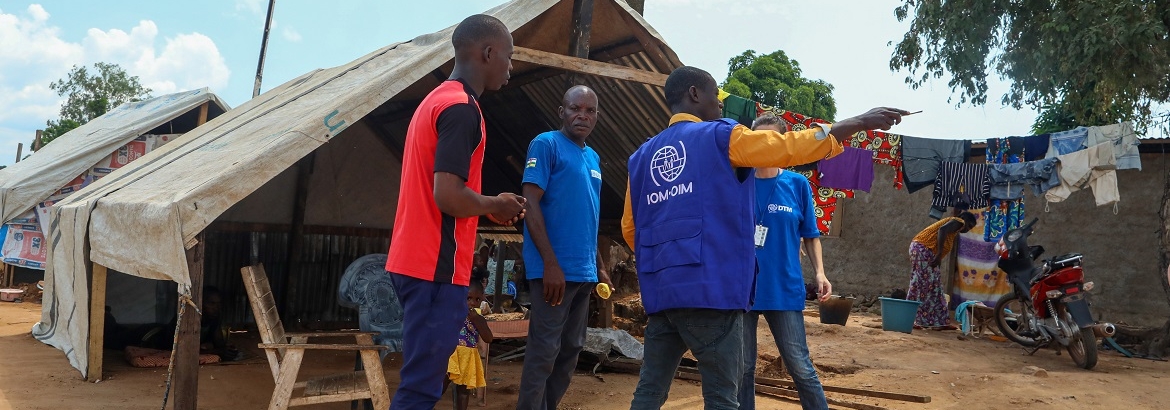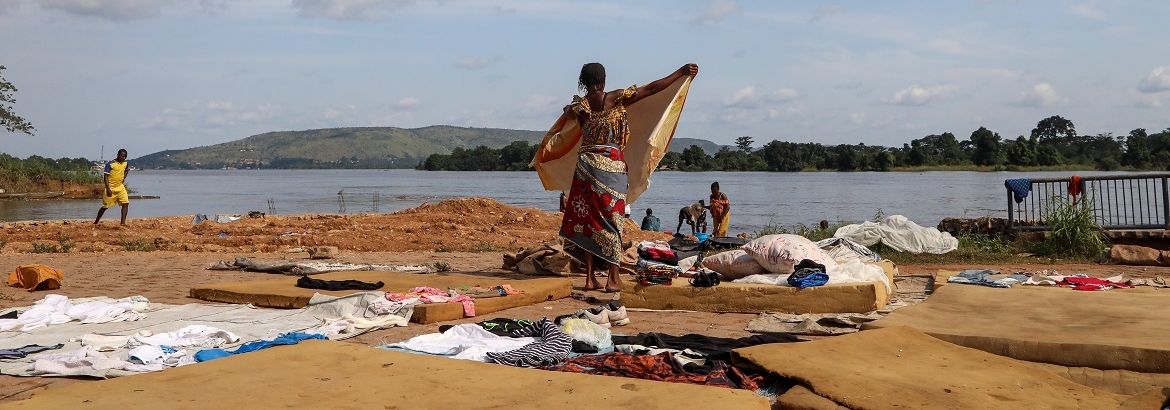IOM Vision
IOM intends to provide multisectoral humanitarian assistance to conflict and disaster-affected populations in the Central African Republic (CAR) while promoting durable solutions tailored to the local needs and priorities of internally displaced persons (IDPs) and communities.
Objective
Saving lives and protecting people on the move
- IDPs at high risk of protracted displacement, and unsuccessful returnees;
- Vulnerable host communities in areas of displacement and communities of return where services are inadequate or overstretched;
- Returnee IDPs, facing continued needs for assistance;
- Victims/survivors of violence and stranded migrants;
- Local actors to provide the services.
IOM will provide camp management support to the government as the CCCM cluster co-lead in CAR, focusing on:
- Providing dedicated staff for cluster coordination and information management;
- Ensuring the collection, analysis and sharing of data to guide interventions towards the most vulnerable displaced populations;
- Building capacities of all actors on CCCM and advocating for well-planned and dignified camp consolidation and closure processes, and respect of the IDPs' right of movement;
- Improving living conditions of displaced persons by monitoring displacement flows, facilitating the effective provision of assistance and protection in camps and camp-like settings, advocating for durable solutions and ensuring organized closure and phase-out of camps.
IOM will provide assistance to victims/survivors of violence notably armed conflict, gender-based violence and trafficking in persons, organize raise awareness campaign on protection and prevent and respond to sexual exploitation and abuse. IOM ensures that protection is mainstreamed in all of IOM’s interventions. IOM's initiatives will include:
- Providing direct assistance to victims/survivors of violence notably armed conflict, gender-based violence and trafficking in persons in close coordination with other protection actors following available referral mechanism;
- Raising awareness on gender-based violence and diverse forms of exploitation among at-risk populations;
- Building counter-trafficking capacity among humanitarian actors and government officials;
- Ensuring that protection is mainstreamed in all of IOM’s interventions through adaptation of intervention design to better include and address the needs and risks of vulnerable groups;
- Ensuring a robust approach to preventing and responding to sexual exploitation and abuse (PSEA) by organizing training/awareness-raising sessions.
IOM intends to respond to the priority needs of people affected by humanitarian shocks. IOM will consolidate its contingency capacity to continue to preposition emergency stocks (including emergency shelter, NFI kits, COVID-19 kits) in order to immediately respond to any type of emergency and population movement and to contribute to ensuring the human dignity of people affected by prolonged displacement. IOM's initiatives will include:
- Providing emergency assistance to vulnerable families (vulnerable host community households as well as IDPs - in sites and host communities - and returnees) affected by conflicts and/or disasters living in critical or substandard shelters in informal sites and areas of return, through in-kind or emergency assistance;
- Improving living conditions in camps and host communities through shelter and NFI kit distributions for IDPs;
- Improving the living conditions of vulnerable households (returnees) through the rehabilitation of damaged and substandard housing to support conditions of safety, privacy and dignity;
- Organising and distributing COVID-19 basic prevention materials (e.g. soap, baskets and masks) to conflict crisis/disaster-affected populations;
- Prepositioning NFI and shelter kits to respond to crises and/or complement the emergency response with other actors. In relation to NFI and shelter kits, IOM seeks to maintain and reinforce the prepositioning of its stocks to be able to respond to the needs rapidly.
IOM will provide MHPSS assistance to affected populations and build the capacity of other humanitarian actors in providing psychosocial and psychological support. IOM's initiatives will include:
- Providing MHPSS support to the affected population in line with the IOM Manual on Community-Based Mental Health and Psychosocial Support in Emergencies and Displacement;
- Building the capacity of humanitarian actors in providing psychological first aid (PFA);
- Building the capacity of local actors to provide MHPSS services.

Objective
Driving solutions to displacement
- IDPs;
- Returnees and host communities in areas of return, seeking access to basic services, livelihoods, safety and security;
- Survivors of GBV;
- Government authorities, civil society organizations and NGOs contributing to capacity building and facilitating community stabilization and resumption of services.
The health crisis not only impacts the physical wellbeing of the affected populations but also exacerbates socioeconomic vulnerability in the area. The proposed activities intend to address the socioeconomic impact of the COVID-19 pandemic and HIV/AIDS at the community level, especially to avoid any stigmatization and discrimination against migrants, people living with health conditions, and the local population living in high-risk areas. IOM's initiatives will include:
- Organising awareness-raising and community dialogue activities on COVID-19 to prevent community-level conflict related to human mobility, especially in the border regions;
- Organising awareness-raising activities on the fight against HIV/AIDS targeting displaced populations and host communities through radio, television and other forms of accessible mass media.
Peacebuilding activities directly contribute to the transition of communities out of conflict and help generate early peace dividends. Such initiatives will also aim to strengthen community capacity to promote the peaceful resolution of conflicts and respond to threats that might lead to relapse into conflict or violence. IOM's initiatives will include:
- Promoting reconciliation, social cohesion, and peaceful resolution of conflicts at the community level through support to local conflict resolution mechanisms, and a joint prioritization exercise bringing feuding parties and local authorities to jointly agree on key activities and infrastructures that will directly contribute to the restoration of the Common Good, of local governance and social cohesion.
Following the wave of violence that spread through the entire country during the conflict that started in 2013, the local economy and state authority have been significantly weakened. To date, the government is not able to address existing gaps in basic service provision for the population or restore effective employment opportunities for youth, furthering weakening the legitimacy of the state and deepening the persisting impact of the conflict. This situation has been exploited by armed groups to recruit among their ranks aggrieved youth, further destabilizing at-risk localities. IOM is focusing on the engagement of at-risk youth to reduce violence and promote their constructive integration in society and improve the security situation. IOM's initiatives will include:
- Enhancing the quality of skills training and improve skills training centres;
- Supporting the enrollment of youth into skills training programs and developing new economic opportunities/skills set in line with community needs;
- Reinforcing coordination between the state, local enterprises and skills training centres to ensure that skills set matches the needs on the job market;
- Economic reintegration of conflict-affected youth through viable, market verified income-generating activities;
- Establishing local committees composed of members representing all society (i.e. women, youth, Muslims, Christians) and the relevant government representative (i.e. the Prefect, Sub Prefect, Mayor, and chief of village);
- IOM implements social cohesion activities along at-risk zones, as defined by the Transhumance Tracking Tool, to work with local governance structures in communities where transhumant movements may trigger tensions between herders and farmers to define conflict mitigation and resolutions methods to ensure peaceful transhumant campaigns. Where additional community infrastructure may be needed in order to cater for the passage of transhumant movements, IOM similarly supports the participatory local decision-making processes to define priority infrastructure that would contribute to conflict mitigation or resolution, and supports relevant line ministries to respond to this collective prioritisation in direct response by implementing identified solutions for communities who may otherwise be aggrieved.
As displaced populations continue to return to their places of origin, there is urgent and significant need to support recovery efforts and build community resilience to address the factors which drove forced displacement. Informed by its DTM Stability Index, and applying the principles from its Framework on the Progressive Resolution of Displacement Situations, IOM operates in areas of return deemed poised for longer-term sustainable recovery by working to improve access to basic social services, to restore infrastructure, to promote socio-economic recovery, including through support to social cohesion, local governance restoration, and through renewing access to livelihoods, and to greater economic opportunities. IOM's initiatives will include:
- Constructing semi-sustainable shelters and distributing NFI kits;
- Improving livelihoods of returnee communities through cash for work activities, restoring infrastructures, and promoting social cohesion;
- Improving livelihoods of returnee communities through Unconditional Multipurpose Cash Transfers;
- Improving access to protection services.
Objective
Contribute to an evidence-based and efficient crisis response system
- Government entities and organizations receiving the DTM data to orient their crisis response activities.
The IOM Displacement Tracking Matrix is an information management system to monitor population displacement during crises. In CAR, IOM will:
- Monitor locations of IDPs and returnees, assess their intentions and barriers to return, and give an overview on the severity of conditions in areas of return, among other key elements, providing the necessary information for recovery and crisis prevention programming;
- Activate its "Emergency Tracking Tool” where there is no RRM actor, which provides timely data on the number of individuals displaced due to recently emerging crises such as droughts, floods, etc.;
- Monitor cross-border transhumance flow in the Western region that borders Cameroon and the Northern region that borders Chad, to provide an evidence base and trends on transhumance and corridors and potential conflicts arising using the transhumance tracking tool (TTT);
- Moderate joint analysis and provide evidence-based recommendations in terms of sustainable solutions to internal displacement in CAR;
- IOM’s Stability Index will inform efforts to support recovery efforts and build community resilience.
Central African Republic
The map used here is for illustration purposes only. Names and boundaries do not imply official endorsement or acceptance by IOM.
Figures are as of 31 December 2023. For more details of IOM's operational capacity in country, please see the IOM Capacity section.







